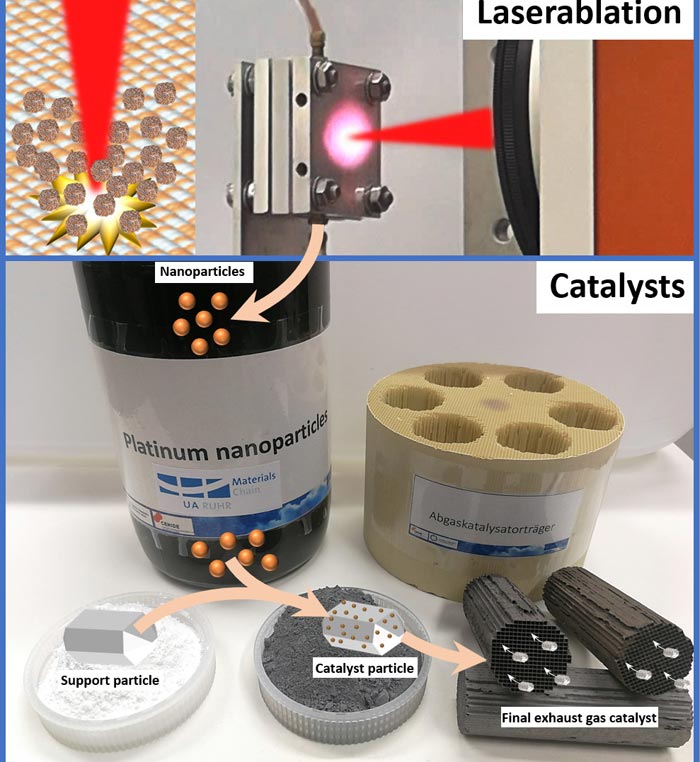Catalyst Material from the Laser Lab

From particle production to the final catalyst (schematic diagram).
© UDE/CENIDE
Industrial Relevance Proven
In catalysts, more surface area usually equals more activity. And hardly anything offers more surface than structures made of nanoparticles. Scientists from the Center for Nanointegration (CENIDE) at the University of Duisburg-Essen (UDE) have shown that it makes sense in economic terms to produce catalytically highly active particles by laser. Not only are they extremely pure, but even at low temperatures they are more efficient than their conventionally produced counterparts. This has been demonstrated in tests conducted by an industrial partner.
Exhaust gases from the diesel engine usually pass a catalytic converter consisting of platinum and palladium particles on an alumina carrier. The particles are smaller than 10 nanometers in diameter and have so far mainly been produced in a wet-chemical process, i.e. in a multi-step process that has to be optimized for each composition. Tests with new materials are therefore time-consuming and expensive.
Laser ablation, on the other hand, makes it possible to produce highly pure nanoparticles from a solid in one step. In this process, a laser vaporizes material from the surface of a platelet with ultra-short pulses. The platelet is made of the selected raw material and lies in a liquid. The fragments then assemble into nanoparticles. That’s it.
The former disadvantage of the method: Until now, the output of the desired particle size was limited. But Dr. Sven Reichenberger from Technical Chemistry I and his team found a solution: “We placed the focus point of the laser slightly above the platinum-palladium plate in the solution.”
In this way, more than one gram per hour in the desired size can be produced selectively. The scientists who work at the NanoEnergieTechnikZentrum (NETZ) have thus exceeded the decisive limit where the laser method is more economical than the wet chemical method due to the low running costs. The trade magazine “Nanomaterials” covers this in its current issue.
Better Performance Even at Lower Temperatures
Umicore as industrial partner has tested the resulting particles under realistic conditions: Even at low temperatures the catalyst shows a much higher activity than the classic product. Moreover, it converts carbon monoxide equally well and nitrogen oxides even better into ecologically safe products.
“This was our milestone to prove the industrial relevance of the method,” says Reichenberger. “Now we will test further materials.”
Editor: Birte Vierjahn, +49 203/37 9-8176, birte.vierjahn@uni-due.de
Wissenschaftliche Ansprechpartner:
Dr. Sven Reichenberger, Technical Chemistry I, +49 203/37 9-8116, sven.reichenberger@uni-due.de
Originalpublikation:
S. Dittrich, S. Kohsakowski, B. Wittek, C. Hengst, B. Gökce, S. Barcikowski, S. Reichenberger
„Increasing the Size-Selectivity in Laser-Based g/h Liquid Flow Synthesis of Pt and PtPd Nanoparticles for CO and NO Oxidation in Industrial Automotive Exhaust Gas Treatment Benchmarking“
Nanomaterials 2020, 10(8), 1582
https://doi.org/10.3390/nano10081582
https://www.uni-due.de/2020-10-02-particles-for-catalysts-by-laser
Media Contact
All latest news from the category: Life Sciences and Chemistry
Articles and reports from the Life Sciences and chemistry area deal with applied and basic research into modern biology, chemistry and human medicine.
Valuable information can be found on a range of life sciences fields including bacteriology, biochemistry, bionics, bioinformatics, biophysics, biotechnology, genetics, geobotany, human biology, marine biology, microbiology, molecular biology, cellular biology, zoology, bioinorganic chemistry, microchemistry and environmental chemistry.
Newest articles

Self-Destructing Cancer Cells: Cutting-Edge RNA Breakthrough
Jülich scientists use novel RNA technology to selectively switch off tumours in the brain. An Adaptable Platform Technology That Destroys Glioblastoma Cancer Cells Using a special RNA molecule, a team…

Endurance Training: Transforming Lives of Heart Failure Patients
Can strength and endurance training be beneficial for patients with a certain form of heart failure? A research team from Greifswald investigated this question together with seven other research centers…

A Wake-Up Call for Mediterranean Shark Protection Against Extinction
Overfishing, illegal fishing and increasing marketing of shark meat pose significant threats to the more than 80 species of sharks and rays that inhabit the Mediterranean Sea, according to a…



